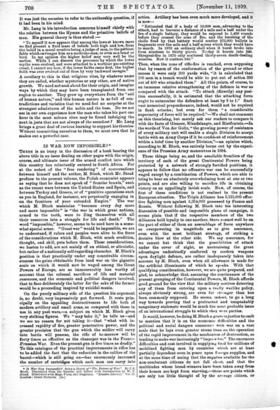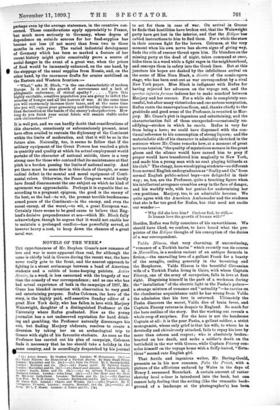IS WAR NOW IMPOSSIBLE?*
THERE is no irony in the discussion of a book bearing the above title in an issue dealing on other pages with the origin, course, and ultimate issue of the armed conflict into which this country has reluctantly entered in South Africa. For at the outset of the "free rendering" of conversations between himself and the author, M. Bloch, which Mr. Stead prefixes to the present volume, the Polish economist appears as saying that he does not speak of "frontier brawls," such as the recent wars between the United States and Spain, and between Turkey and Greece, or of "punitive operations such as you in England, for instance, are perpetually engaging in on the frontiers of your extended Empire." The war which M. Bloch maintains "becomes every day more and more impossible" is "the war in which great nations, armed to the teeth, were to fling themselves with all their resources into a struggle for life and death." The word "impossible," however, seems to be used here in a some- what special sense. "Great war" would be impossible, we are to understand, if rulers and peoples were alive to the force of the considerations which M. Bloch, with much erudition, thought, and skill, puts before them. These considerations, we hasten to add, are not mainly of an ethical, or altruistic, but rather of a nationally self-regarding character. M. Bloch's position is that practically under any conceivable circum- stances the gains obtainable from land war on the gigantic scale on which it would now be waged among the Great Powers of Europe, are so immeasurably less worthy of account than the colossal sacrifices of life and material resources, and the economic and political dangers involved, that to face deliberately the latter for the sake of the former would be a proceeding inspired by suicidal mania.
On the purely military side of the question his argument is, no doubt, very impressively put forward. It rests prin- cipally on the appalling destructiveness to life both of modern artillery and small arms, as compared with those in use in any past wars,—a subject on which M. Bloch gives very striking figures. We "may take it," he tells us—and we see no reason for not taking it—that "what with in- creased rapidity of fire, greater penetrative power, and the greater precision that the gun which the soldier will carry into battle will possess, the rifle of to-morrow will be forty times as effective as the chassepot was in the Franco- Prussian War. Even the present gun is five times as deadly." To this catalogue of the practical improvements in rifles has to be added the fact that the reduction in the calibre of the barrel—which is still going on—has enormously increased the number of cartridges which each man can carry into • Is War Now Impossible? being a Digest of "The Future of War." By I. S. Bloch. Translated from the Russian. and Edited with Introduction by W. T. Stead. Illustrated with Maps. Plana, and Diagrams. - Russian Library," Vol. II. London : Grant Richards. (Gs.]
action. Artillery has been even much more developed, and it is now-
" Estimated that if a body of 10,000 men, advancing to the attack, had to traverse a distance of a mile and a half under the fire of a single battery, they would be exposed to 1,450 rounds before they crossed the zone of fire, and the bursting of the shells fired by that battery would scatter 275,000 bullets in fragments over the mile and a half across which they would have to march. In 1870 an ordinary shell when it burst broke into from nineteen to thirty pieces. To-day it bursts into 240. Shrapnel-fire in 1870 only scattered thirty-seven death-dealing missiles. Now it scatters 340."
Then, when the zone of rifle-fire is reached, even supposing that by reason of the conformation of the ground or other
causes it were only 300 yards wide, "it is calculated that 100 men in a trench would be able to put out of action 336 out of 400 who attacked them." All this points, of course, to an immense relative strengthening of the defence in war as compared with the attack. "To attack (directly) any posi- tion successfully, it is estimated that the attacking force
ought to outnumber the defenders at least by 8 to 1." Such vast numerical preponderance, indeed, would not be required in flank attacks ; but even for them " a considerable superiority of force will be required."—We shall not comment on this theorising, but merely ask oar readers to compare it with the facts of Glencoe, Elandelaagte, and Rietfontein.—In the words of Von der Goltz, "the growing power of resistance of every military unit will enable a single Division to accept battle with an Army Corps if it be confident of reinforcement within a brief time by another Division,"—an opinion which, according to M. Bloch, was entirely borne out by the experi- ence of the Prussian Army mameuvres in 1894.
These things being so, and the assailable frontiers of the territory of each of the great Continental Powers being protected by a network of strongly fortified positions, it appears to follow that no offensive war can be successfully
waged except by a combination of Powers, which are able to bring to bear an absolutely overwhelming host at one or two
points, and are also willing to sacrifice life in obtaining victory on an appallingly lavish scale. Now, of course, the first of these conditions is not realised in the present European situation. The Triple Alliance has 5,135,000 effec- tive fighting men against 5,354,000 possessed by France and Russia. Without following M. Bloch into his interesting discussion of possible and impossible plane of campaign, it seems plain that if the respective members of the two Alliances hold loyally to one another, there cannot well be on the part of either of them an assemblage of force anywhere so overpowering in magnitude as to give assurance, even with the most brilliant strategy, of striking a decisive blow at the other side. We say assurance, for we cannot but think that the possibilities of attack under the cover of night, as neutralising the great advantages undoubtedly conferred by modern weapons upon daylight defence, are rather inadequately taken into account by M. Bloch, even when all allowance is made for the artificial illuminants of which he sp.-aks. With that qualifying consideration, however, we are quite prepared, and glad, to acknowledge that, assuming the continuance of the present grouping of the Continental Powers, M. Bloch affords good ground for the view that the military motives deterring
any of them from entering upon a really warlike policy, always obviously strong, are even far streuger than has been commonly supposed. He seems. indeed, to go a long way towards proving that a protracted and unspeakably sanguinary stalemate would be much the most probable issue of an international struggle to which they w..re parties.
It would, however, be doing M. Bloch a grave injustice to omit
to mention that it is on the economic difficulties and the political and social dangers connectei wail war on a vast
scale that he lays even greater stress twill ou the operation of the rapid improvement in the mechap ism of destruction, as tending to make war increasingly " in, po-fe b I e." The enormous difficulties and cost involved in supplying food for millions of mobilised fighting men by countries which are at least partially dependent even in peace upon foreign supplies, and at the same time of seeing that the supplies available for the
non-combatant citizens do not fall ',hart. and that the multitudes whose bread-winners have been taken away from
their homes are kept from starving,—these are points which are only too little thought of by the ay.-rage citizen, or
perhaps even by the average statesman, in the countries con- cerned. These considerations apply appreciably to France, lbat much more seriously to Germany, whose degree of dependence on outside sources for her food-supplies has become not less (if not more) than from two to three months in each year. The varied industrial development of Germany which has been so marked a feature of her recent history might quite conceivably prove a source of
social danger in the event of a great war, when the prices of food would be immensely enhanced, on the one hand, by
the stoppage of the usual supplies from Russia, and, on the other hand, by the enormous drafts for armies mobilised on the Eastern and Western frontiers What," asks M. Bloch, "is the one characteristic of modern Europe. Is it not the growth of nervousness and a lack of
phlegmatic endurance, of stoical apathy ? Upon this highly excitable, sensitive population you are going to inflict the miseries of hunger and all the horrors of war. At the same time you will enormously increase their taxes, and at the same time also you will expose your governing and directing classes to more than decimation at the hands of the enemy's sharpshooters. How long do you think your social fabric will remain stable under such circumstances ?"
It is well put, and we can hardly doubt that considerations of this character, consciously or subconsciously present, must have often availed to restrain the diplomacy of the Continent within the limits of moderation, and that it will be so in the future also. Naturally, too, it seems to follow that if the military equipment of the Great Powers has reached a pitch
in quantity and quality at which its actual employment would partake of the character of national suicide, there is a very strong case for those who contend that its maintenance at that pitch is a burden passing the limits of national sanity. And yet there must be some flaw in this chain of thought, or some
radical defect in the mental and moral equipment of Conti- nental rulers. Otherwise, the Peace Congress would hardly have found disarmament the one subject on which no kind of agreement was approachable. Perhaps it is arguable that as, according to a pregnant epigram, the good is the enemy of the best, so the bad—to wit, the present terrible burdensome armed peace of the Continent—is the enemy, and even the surest enemy, of the worst,—to wit, a great European war. Certainly there seems to be good cause to believe that Eng- land's decisive preponderance at sea—which Mr. Bloch fully acknowledges, though he argues that it would not enable her to maintain a prolonged conflict—has powerfully served, at
however heavy a cost, to keep down the chances of a great naval war.











































 Previous page
Previous page